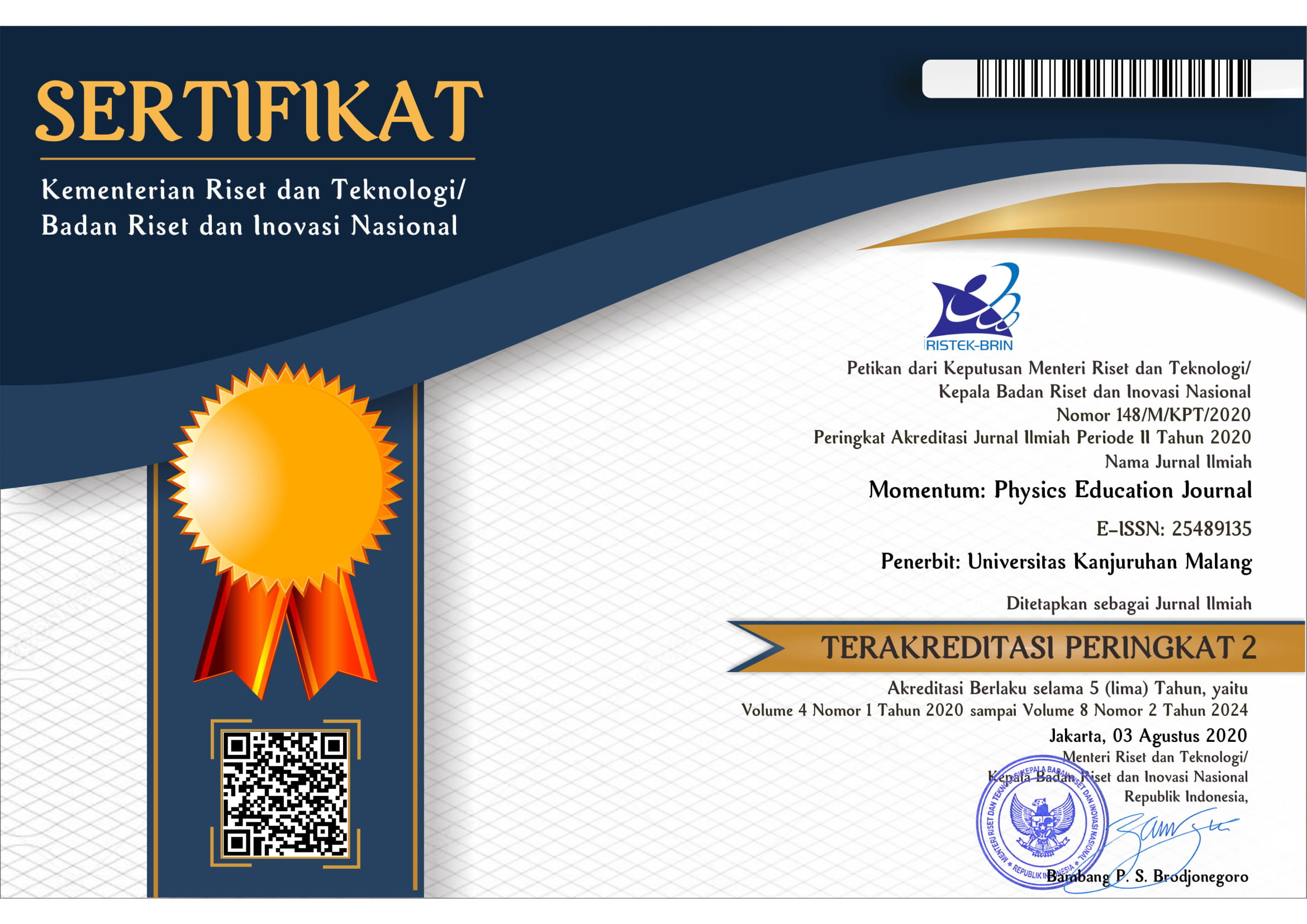Pendekatan Saintifik di Sekolah Dasar
DOI:
https://doi.org/10.21067/mpej.v1i1.2368Keywords:
scientific approach, scientific process skill, scientific methods, elementary school, pendekatan saintifik, keterampilan proses sains, metode ilmiah, sekolah dasarAbstract
Abstract: One of the features of the 2013 Curriculum is a scientific-based learning approach. The purpose of this study was to describe the understanding, implementation, and barriers of elementary school teachers towards a scientific approach. This research method is descriptive qualitative. Respondents were 50 teachers of SDN at Kecamatan Sukun Malang. Data were obtained through open questionnaire techniques and document Teachers' learning plan. The data are described and analyzed to get an overview of elementary school teacher's understanding of the scientific approach. The results show that the scientific approach can serve as a science process skill and a scientific method. Teachers at the SDN in Kecamatan Sukun Malang understand the scientific approach as a science process skill, not yet understanding the scientific approach as a scientific method. These results can be used as a reference to train elementary school teachers in implementing a scientific approach. Abstrak: Salah satu ciri Kurikulum 2013 adalah pembelajaran berbasis pendekatan saintifik. Penelitian ini bertujuan untuk mendeskripsikan pemahaman, pelaksanaan, dan hambatan guru sekolah dasar terhadap pendekatan saintifik. Metode penelitian ini adalah deskriptif kualitatif. Responden sejumlah 50 guru SDN di Kecamatan Sukun Kota Malang. Data diperoleh melalui penyebaran angket terbuka dan dokumen rencana pembelajaran. Data yang diperoleh dideskrpsikan dan dianalisis sehingga didapatkan gambaran umum tentang pemahaman guru Sekolah Dasar terhadap pendekatan saintifik. Hasil penelitian menunjukkan bahwa pendekatan saintifik dapat berfungsi sebagai keterampilan proses sains dan metode ilmiah. Guru-guru Sekolah Dasar di Kecamatan Sukun Kota Malang memahami pendekatan saintifik sebagai keterampilan proses sains, belum memahami pendekatan saintifik sebagai metode ilmiah. Hasil penelitian dapat dijadikan referensi untuk melatih guru sekolah dasar dalam mengimplementasikan pendekatan saintifik.Downloads
References
Abdi, A. 2014. The Effect of Inquiry-based Learning Method on Students’ Academic Achievement in Science Course. Universal Journal of Educational Research 2(1): 37-41. DOI: 10.13189/ujer.2014.020104
Ain, N., Prabowo, & Suparman, K. 2014. Guru kreatif kelas IV SD, tema “Selalu Berhemat Energiâ€Â: Implementasi Kurikulum 2013. Prosiding Seminar Nasional Pendidikan Sains PPS Unesa 18 Januari 2014. Hal. 29-38. Surabaya: Jaudar Press. ISBN 978-602-14702-6-8.
Argaw, A. S., Haile, B. B., Ayalew, B.T., and Kuma, S. G. 2017. The Effect of Problem Based Learning (PBL) Instruction on Students’ Motivation and Problem Solving Skills of Physics. EURASIA Journal of Mathematics Science and Technology Education, 13(3):857-871. http: doi.org/10.12973/eurasia.2017.00647a.
Ayuni, F. N. 2015. Pemahaman guru terhadap pendekatan saintifik (scientific approach) dalam pembelajaran geografi. Gea, Jurnal Pendidikan Geografi, 15(2): 1-7.
Balim, A.G. (2009). The effects of discovery learning on students’ success and inquiry learning skills. Eurasian Journal of Education Research. 35, 1-20.
Castillo, M. 2013. The Scientific Method: A Need for Something Better? AJNR Am J Neuroradiol 34:1669 -1671. http://dx.doi.org/10.3174/ajnr.A3401
Darmojo, H dan Kaligis, J.R.E. 1992. Pendidikan IPA 2. Jakarta: Depdikbud Dirjendikti.
Karsai, I and Kempis, G. 2010. The Crossroads between Biology and Mathematics: The Scientific Method as the Basics of Scientific Literacy. BioScience. 60(8): 632-638.
Machin, A. 2014. Implementasi pendekatan saintifik, penanaman karakter dan konservasi pada pembelajaran materi pertumbuhan. Jurnal Pendidikan IPA Indonesia. 3(1): 28-35.
Mahzum. 2014. Aplikasi pendekatan pembelajaran saintifik metode inquiry based learning pada kompetensi dasar menerapkan hukum-hukum yang berhubungan dengan fluisa status dan dinamis untuk meningkatkan hasil belajar siswa kelas X SMK. Jurnal Phenomenon. 4(1): 111-127.
McPherson, G.R. 2001. Teaching & Learning the Scientific Method . The American Biology Teacher, 63(4): 242-245.
Nafisah, Y.N dan Suyanto, W. 2014. Penerapan model pembelajaran problem-based learning, untuk meningkatkan keterampilan berpikir kritis dan prestasi belajar siswa. Jurnal Pendidikan Vokasi, 4(1): 125-143.
Nichols, A. J. and Stephens, A. 2013. The Scientific Method and the Creative Process: Implications for the K-6 Classroom. Journal for Learning through the Arts, 9(1):1-12.
Permendikbud No 57 tahun 2014 tentang Kurikulum 2013 Sekolah Dasar dan Menengah.
Ruminiati dan Andayani, K. 2016. Analisis kesesuaian isi buku tematik kelas IV sekolah dasar dengan penddikan karakter dan pendekatan saintifik. Sekolah Dasar, 25(1): 27-36.
Yang, E.F.Y., Liao, C.C. Y., Ching, E., Chang, T., & Chan, T. W. (2010). The effectiveness of inductive discovery learning in 1: 1 mathematics classroom. Proceedings of the 18th International Conference on Computers in Education. Putrajaya, Malaysia: Asia-Pacific Society for Computers in Education. 743-747.
Zerafa, I., & Gatt, S. (2014). Implementing a science curriculum reflecting an inquiry based approach in the Upper Primary Years. IPSE Journal, 1(2), 13-26.
Wieman, C. and Gilbert. S. 2015. Taking a Scientific Approach to Science Education, Part I–Research. Microbe,10 (4), 152-156
Downloads
Published
How to Cite
Issue
Section
License
Copyright (c) 2018 Momentum: Physics Education Journal

This work is licensed under a Creative Commons Attribution-ShareAlike 4.0 International License.


.png)
.png)
.png)
.png)




